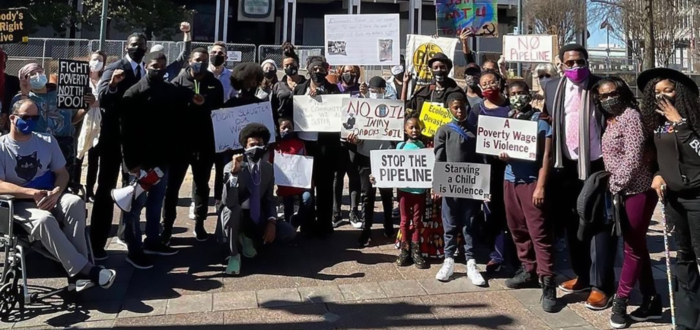
Black Climate Week 2021 ran from Monday, Feb. 21 to Friday, Feb. 25
OAKLAND, Calif. – In honor of Black History Month, The Solutions Project launched the second annual Black Climate Week. Every year, the campaign focuses on a different theme related to Black leadership in the climate movement. This year, the campaign celebrates the work of 14 organizations that are spearheading climate justice solutions that are rooted in Black history.
“I’m proud to see Black Climate Week highlight leaders and organizations who continue to create Black history and reimagine Black futures every day by innovating solutions that are rooted in intergenerational learning and wisdom,” said Gloria Walton, President and CEO of The Solutions Project. “Black communities have always had a deep connection with the land and are caretakers of the planet. We are often the most impacted by the climate crisis, but this also means that we are at the forefront of intersectional climate justice solutions that improve environmental conditions, create good green jobs, and address systemic changes across the board.”
As part of its Sustainable Square Mile initiative, BIG purchased the Emmett and Mamie Till-Mobley home and plans to open it as a museum which tells the family’s story through the lens of America’s Great Migration history. Naomi is the proud granddaughter of Mississippi sharecroppers. Her mother was one of the six million Black Americans who moved from the rural South to cities in the Northeast, Midwest, and West during the Great Migration in the 1910s to 1970. The Emmett & Mamie Till-Mobley House Museum, Garden & Theatre is envisioned as an international heritage shrine, a legacy memorial of Great Migration tragedy and triumph, and a prototype of the intersection of environmental justice, economic sustainability, and the conservation lifestyle. Naomi co-founded the Coalition of Black House Museums and recently held a Black History Month press conference highlighting the importance of protecting Black house museums as “living artifacts” where influential Black people are celebrated. Naomi said, “Black History Month is not only about looking back. It’s also about reinventing today the community infrastructure once typical in Black America as we birthed the Underground Railroad, the Great Migration, and the Civil Rights movement.”
Last year, The Solutions Project launched Black Climate Week in part to draw attention to the under-representation of climate justice leaders of color at Climate Week NYC. In response, Climate Week NYC invited The Solutions Project to serve as its official environmental justice partner in 2021. The Solutions Project participated in the opening ceremony and organized events, including New York Leads on Climate Policy and Climate Justice Technology Solutions – Stories from the Frontlines.
“Throughout U.S. history, Black people have demonstrated tremendous resiliency and love for our communities. When we experience injustice, we support one another and develop revolutionary solutions,” said Shimekia Nichols, who spoke at The Solutions Project’s Climate Justice Technology Solutions event at Climate Week NYC last year. “Our work on climate and the environment is a shining example of that. In Highland Park, our local utility DTE Energy removed our streetlights and left us in the dark. In response, we’re putting in new solar-powered streetlights, which are better for the environment, and we get to own and control them.”
Black Climate Week reflects The Solutions Project’s mission to support and elevate the work of People of Color in the climate justice movement. This year, every honoree is a Solutions Project grantee. Since launching its 100% Commitment to Justice in 2019, The Solutions Project has proudly supported 95 Black-led grassroots organizations, giving more than $4 million in grants and providing in-kind strategic communications and social media support.
Throughout Black Climate Week, The Solutions Project will run social media posts on Facebook and Instagram celebrating this year’s honorees. The Hip Hop Caucus will promote the campaign, as well.
“For decades, Black people have led the call for clean air, water, and food while disproportionately living with the effects of pollution and environmental hazards in their communities,” said Rev. Lennox Yearwood, Jr., president and CEO of the Hip Hop Caucus. “Without a doubt, climate justice is racial justice. Black Climate Week is an opportunity to center Black voices and stories in the movement for environmental justice, and honor their creative approaches to build equitable and healthy communities.”